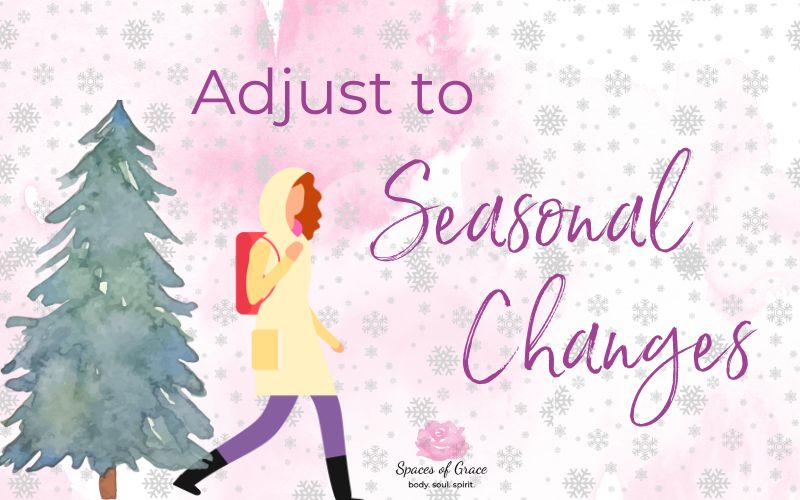Changing Season Changing Body & Mind
With a huge yawn I forced myself out of my comfy chair and cozy blanket where I’d dozed after a busy day. I might as well get ready for bed. I walked into the kitchen to switch off the over-the-sink light and glanced at the clock. 7:30!? That can’t possibly be right. I looked at my fitness watch. It was.
The shortening days of winter are messing with me. Just a month ago, I was still outside at this time, enjoying an evening walk or bike ride before sunset. Now it’s dark, I’m barely able to keep my eyes open, I want to eat CARBS, and my body is begging me to go to bed already.
So what seasonal body changes can we expect as we transition to winter? Let’s talk about it.
Seasonal Changes to Body & Soul
1.Insulin Resistance. This may come as a surprise, but Dee Volek states in an article for The Premier Medical Group, that between late summer and early fall our bodies increase their insulin resistance. Our livers are preparing for winter by increasing fat production to store in our tissues. So it’s true that we really do have a tendency to gain weight in the winter.
Solution 1: Give your metabolism a boost by exercising. If you’re like me, exercise is harder in the winter. I much prefer outdoor exercise, but I’ve found I need an indoor bad weather exercise strategy when it’s not possible.
Solution 2: Begin a healthy eating plan to combat seasonal changes. In the winter we all want to load up on unhealthy carbs, but choose a plan like Kelly Leveque’s Body Love (I start my day with her Fab Four Smoothie), the Mediterranean diet, or others to help you stay on track.
2. Fatigue/Moodiness. Shorter days, daylight saving time, and a weaker sun all change our biorhythms. We feel more tired, may feel more aches and pains, and can struggle with regulating our moods.
Solution 1: Try to get outside in the morning on sunny days. Having the sun’s rays on your face helps set your circadian clock. Even 10 minutes can make a difference. Avoid daytime naps as they make it harder to sleep at night. Add a morning Bible meditation for peace and stability.
Solution 2: Develop an evening routine so you’re not in front of the TV with snacks every night for hours. Try a hobby or craft; take an evening walk with a buddy; read a book; exercise early in the evening. It’s important to establish a consistent bed time. Turn off electronics an hour before bed or at least wear blue-light-filtering glasses.
3. Dry Skin/Dry Eyes/Dry Hair. I tend to dry skin anyway, but in the winter I’m in the full-on alligator category. Lower humidity, cold outside air, winter wind, and indoor heating is a bad combination that dries us out.
Dry Eye Solution: According to the article Winter Wellness by Marge Perry, eating an anti-inflammatory diet that includes Omega-3 fatty acids, Vitamin D, and Vitamin A may improve dry eyes.
Dry Skin solutions: The Winter Wellness article states drinking water and including these elements in your diet can make a difference: kefir, flaxseed oil, red bell peppers, leafy greens, and citrus.
Dry Hair: Coconut oil helps hydrate your hair and may prevent protein loss. Apply a small amount and let it soak in for a few minutes before washing hair. If you like, add a drop or two of essential oil like rosemary for added benefits.
4. Illness: Sickness spreads in the winter months. Right now the trifecta of COVID, RSV, and the flu are on the rise. Some people get SAD, or seasonal affective disorder, which causes season-long depressive symptoms. SAD patients may have an imbalance of their serotonin and melatonin levels.
Solution for SAD: light therapy, psychotherapy, and antidepressants.
Solution 2 for overall health:I love boosting my immunity with herbs, and using essential oils wisely in the home can also help. As a certified aromatherapist and herbalist student, I’ve had success with several strategies to help myself and family.
Using adaptogenic herbs like ashwagandha, holy basil, and schizandra provide stress support. Lemon balm is a nervine and antiviral and is known as the happy herb. You can try these as a tea or tincture. Adding herbal tea to your daily protocal is an easy way to care for yourself.
Diffusing about 10 drops of lavender, lemon, or a combination of both these essential oils can help boost your mood. Don’t use around young children under 5 years of age or pets: safety protocol for children. And always consult your doctor to make sure herbs and essential oils aren’t contraindicated for any meds you may take.

What’s Your Seasonal Changes Favorite Tip?
Get a plan in place so those seasonal changes don’t steal your joy and health. Do you have a favorite tip to adjust to the winter? We’d love to hear it. Leave a comment below.





I love these tips! I’ve found that if I have a bunch of really good books to read on hand from the library, I tend to watch less tv. I’ve also found that setting a good home ambiance can really help my mood. Since it’s dark in St. Louis by 5, I try to add warmth and light by lighting a candle and turning on the Christmas lights.
Amber,
Thanks for sharing your ideas! The library is one of my favorite places, and I agree that a good book is a great alternative to TV. I like the home abidance suggestion. Candles are wonderful, and this time of year, Christmas lights are beautiful. What’s better than reading a book cozied up next to the Christmas tree? Maybe add music too!